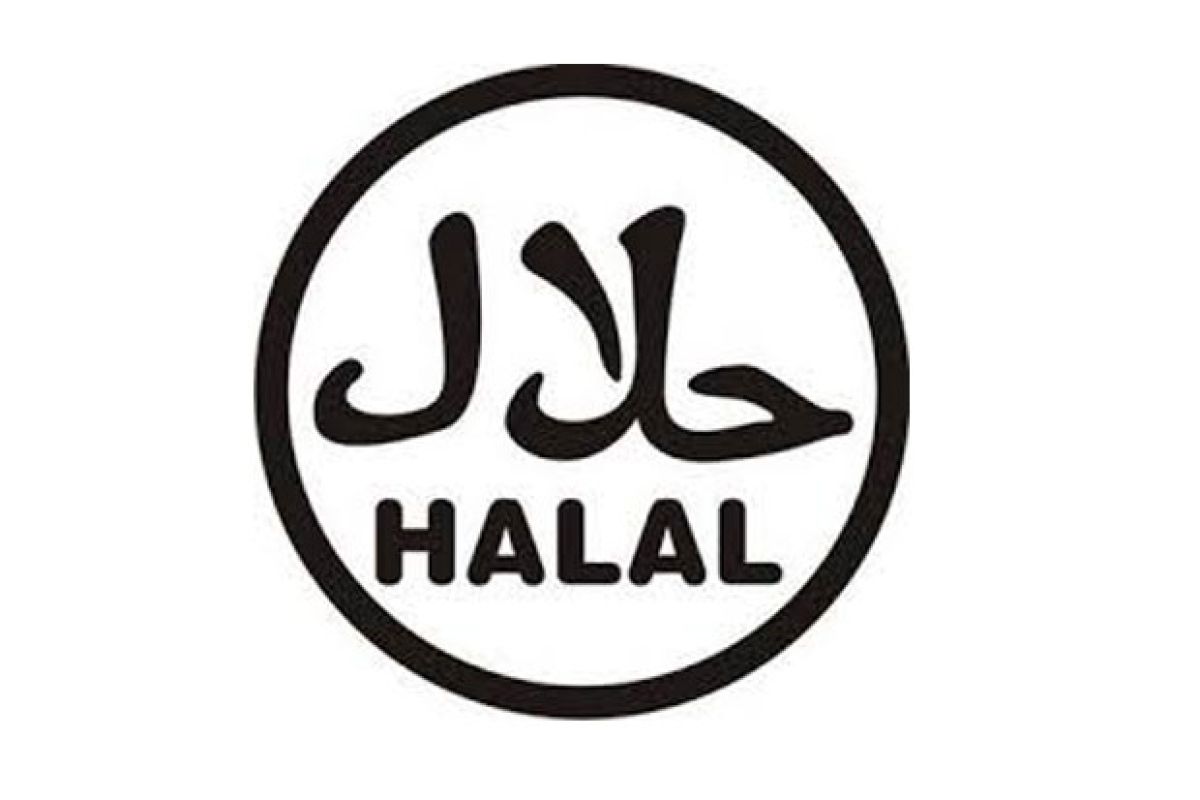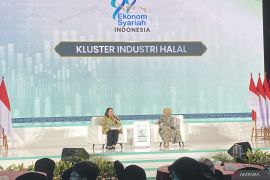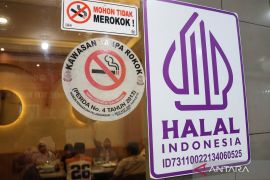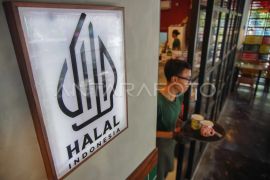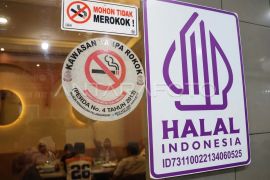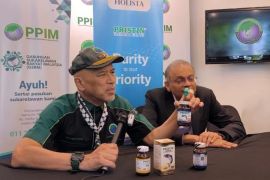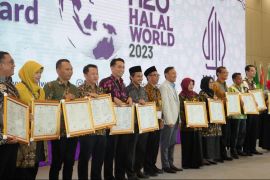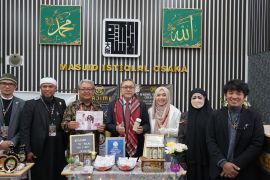The global halal market has reached US$1,294.5 million in 2020 and is expected to touch US$1,911.3 million by the end of 2026, reflecting a CAGR (compound annual growth rate) of 5.7 percent for the 2021-2026 period, according to Global ‘Halal Market’ 2020 Research Report, released last August.
The global halal food market was valued at US$1,140 million in 2018 and is estimated to reach US$1,590 million by the end of 2025, growing at a CAGR of 4.3 percent in the 2019-2025 period.
Brazil, Australia, Japan, North America, and China are among the main halal product producers in the world. But, Indonesia, the world's largest Muslim majority country and the fourth most populous nation in the world, is yet to exploit the potential of the halal business.
In 2019, Brazil’s halal product exports were valued at US$5.5 billion and Australia's at US$2.4 billion, Indonesian Vice President Ma'ruf Amin said recently, referring to data from the 2019 Global Islamic Economic Report.
A professor of Islamic economic law, Amin has set his sights on transforming Indonesia into a global halal product hub by 2024.
"We must be able to exploit the potential of the world's halal market by increasing our exports, which currently only account for 3.8 percent of the global halal market," he noted.
In 2018, the global demand for halal products stood at US$2.2 trillion, and it is projected to touch US$3.2 trillion by 2024. Amin is hopeful of Indonesia’s chances of emerging as the largest halal producer in the world.
The government is currently developing halal industrial zones (KIH) to draw the attention of foreign investors and drive domestic halal production.
"Halal industrial zones, currently growing and developing, are expected to attract the attention of international investors to make Indonesia a global hub for the world's halal products," Amin stated in his opening remarks at a web seminar during the International Halal Conference, organized by Yogyakarta-based Gajah Mada University (UGM) on November 14, 2020.
The halal industrial zones must be made a part of the national and global industrial ecosystem so that they do not stand alone, he explained, adding that sufficient regulations and incentives are required to boost the halal industry.
In addition, the government plans to set up an integrated service center for halal products in each industrial zone. The halal certification process for industrial products is also expected to run quickly.
The establishment of a one-stop service for halal products is supported by the Minister of Industry (Permenperin) Regulation Number 17 of 2020 on procedures for obtaining a certificate in the framework of establishing a halal industrial zone.
"This is the first step in developing an integrated halal industrial zone in Indonesia wherein all services related to halal products are under one roof or one-stop service," Amin stated.
Related news: VP seeks world's largest halal producer tag for Indonesia
Related news: Indonesia should become major halal product exporter
So far, two halal industrial zones -- Modern Cikande Industrial Estate in Serang, Banten, and the SAFE n LOCK Halal Industrial Park in Sidoarjo district, East Java province — have been integrated with industrial estates.
Four other industrial zones are in the process of setting up a halal cluster — Bintan Inti Industrial Zone in Batam, Batamindo Industrial Zone in Batam, Jakarta Pulogadung Industrial Zone, and Surya Borneo Industrial Zone in Central Kalimantan.
Earlier, Coordinating Minister for Economic Affairs, Airlangga Hartarto, had explained that a halal cluster will be formed in each industrial area to ensure the halal-worthiness of products, including the provision of halal certification.
"The existence of a halal cluster at one location is expected to make the halal certification easier and export-oriented. Hence, if it comes from a halal area, it is expected to increase sales," Hartarto noted.
The halal cluster, also referred to as the halal industrial area (KIH), is currently limited to industries producing food and beverages, clothing, medicines, and cosmetics. However, the possibility of expanding the halal clusters to other industrial sectors has not been ruled out, the minister stated.
Related news: Africa viewed as potential market for Indonesia`s halal products
Related news: Indonesia introduces halal products in Moscow
In terms of markets, the 57 member states of the Organization of Islamic Cooperation (OIC) with a total population of 1.86 billion could be a potential market for halal products.
In January-July, 2020, Indonesia's exports to OIC member countries stood at US$10.94 billion, and recorded a surplus of US$2.2 billion.
Farm products comprised the largest share of Indonesia's exports to OIC members, accounting for US$2.6 billion, or nearly 25 percent, of the country's total exports to the OIC market.
Halal products, particularly foods, cosmetics, and medicines, contributed to the good performance of Indonesia's exports to Muslim countries in the January-July, 2020 period. In total, the three products contributed US$515.79 million (to the total exports to OIC), Trade Minister Agus Suparmanto said.
During the same period, Indonesias food exports to OIC members reached US$454.16 million, up 11.37 percent from US$407.81 million during the corresponding period of last year.
While medicine exports increased 12.33 percent to US$31.31 million from US$27.87 million, cosmetics exports declined 8.15 percent to US$30.32 million from US$33.01 million.
However, despite the positive performance of Indonesia's balance of trade with OIC member states, the country is yet to establish itself as a hub for halal products in the world, particularly foods, cosmetics, and medicines, Suparmanto observed.
The market share of the three Indonesian products in the OIC market is still far below that of products from non-Muslim countries, such as Brazil, France, the US, and Germany.
Overall, however, the halal industry has played a significant role in improving the performance of Indonesia’s trade balance.
The export potential of Indonesian halal food is estimated at US$229 million, according to Finance Minister Sri Mulyani.
"If we look at Indonesia, currently, there are 10 top halal food products, with a total export value potential of US$229 million," Sri Mulyani noted.
Indonesia is exporting 10 types of food products — margarine, wafers, biscuits, processed pineapple, packaged coffee, coffee extract, malt extract, sauce, baby food, bread, and cakes — to 29 Muslim-majority countries.
"Of course, we still have a big opportunity for our export share of up to 61 percent that Indonesia should be able to utilize to increase the exports of several products," the minister stated.
The government is providing fiscal incentives that can be used to encourage investment and boost exports of halal products. The incentives have been delegated to the Investment Coordinating Board (BKPM) so that it can directly grant them to boost investment in priority areas.
In addition, micro-, small-, and medium-scale enterprises (MSMEs) will be able to avail free halal certification as stipulated in the omnibus law on job creation.
The Finance Ministry is currently preparing a Finance Ministers Regulation, or PMK, which is in line with the Law on Job Creation on the extension of institutions to conduct halal certification.
The policy of free-of-charge halal certification for MSME is aimed at easing the burden on enterprises. (INE)
Related news: BI pushes RI's halal products to drive global market penetration
Related news: Indonesia calls to establish standard for halal products in Asean
Editor: Yuni Arisandy Sinaga
Copyright © ANTARA 2020
